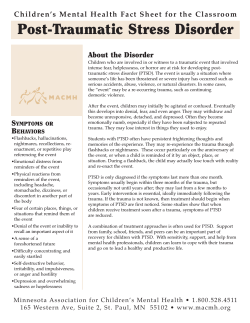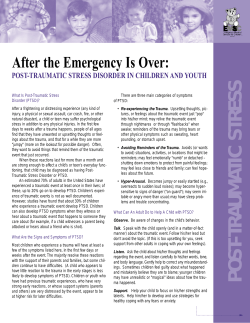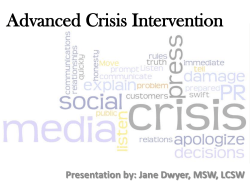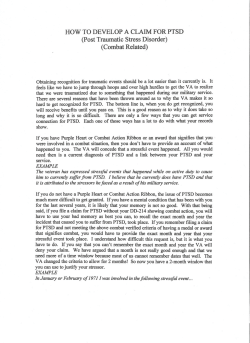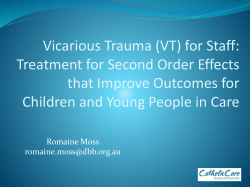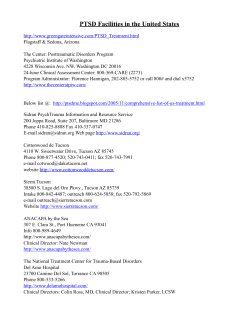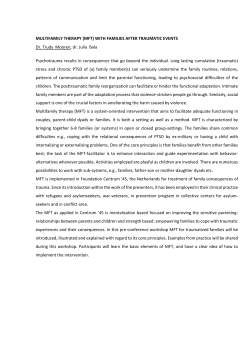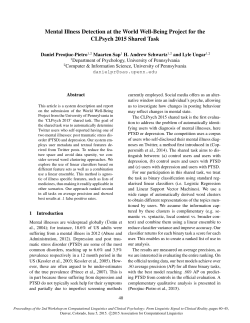
Will grief & life-threatening experience associate with PTSD
Psychological Impact of Motor Vehicle Crash: Preliminary findings from a territory-wide epidemiology study in Hong Kong Kitty Wu, Ph.D. President, Asian Society for Traumatic Stress Studies Convenor, Taskforce for the Epidemiology Study of PTSD in Hong Kong, Division of Clinical Psychology, Hong Kong Psychological Society Members & Collaborators for the study Taskforce Members, DCP HKPS Convenor: Dr. Kitty Wu Secretary: Ms. Philippa Yu Treasurer: Ms. Jamie Cheng Members: Prof. Patrick Leung Ms. Flora Leung Ms. Betty Luk Ms. Joey Lui Ms. Jeanie Ngan Ms. Rose Wong Ms. Patsy Wong Ms. Corine Wong (co-opt) Collaborators, HKMMS & KCH Prof. Linda Lam Dr. CC Lee Dr. Patrick Kwong Dr. Hung Se Fong 2 BACKGROUND POSTTRAUMATIC STRESS DISORDER (PTSD) 3 PTSD is a kind of Trauma- & Stressor-Related Disorders (DSM V, 2013) Diagnostic criteria (apply to adults, adolescents & children>6-yr old): A. Exposure to actual or threatened death, serious injury, or sexual violence (direct experience / witness in person / learn that the trauma occurred to a close one) B. Re-experiencing children ≧ 6-yr old: repetitive play expressing trauma theme frightening dreams w/o recognizable content C. Avoidance D. Negative alterations in cognitions & mood E. Hyperarousal F. >1 month G. The disturbance causes clinically significant distress / impairment in social interaction, work or other important areas of functioning 4 PTSD in pre-school children (≤6-yr old) • when a developmentally-sensitive set of criteria were used, approximately 3 to 8 times more children qualified for the diagnosis • young children have emerging abstract cognitive & verbal expression capacities, thus, the criteria need to be more behaviorally anchored & developmentally sensitive – intrusive memories may not appear to be distressing & may be expressed as play reenactment – constriction of play 5 How common is PTSD? Adult psychiatric morbidity in England, 2007 1st prevalence estimates of screening +ve for PTSD based on a large general population sample of adults in England (N = 7,461; aged ≧16) Edited by Sally McManus, Howard Meltzer, Traolach Brugha, Paul Bebbington, Rachel Jenkins. A survey carried out for The NHS Information Centre for health and social care by the National Centre for Social Research and the Department of Health Sciences, University of Leicester 6 Screening - Report of traumatic events at anytime in life - Trauma Screening Questionnaire (TSQ) for screening of PTSD in the past week 7 Experience of Trauma • A third (33.3%) of people reported having experienced a traumatic event since the age of 16 Probability of PTSD • Overall, 3.0% of adults screened +ve for current p-PTSD 8 PRESENT STUDY DESIGN COLLABORATION WITH HKMMS 9 HKMMS (3-YR POPULATION BASED STUDY) • ~5700 Chinese adults (aged 16-75) • Study period (2010 – 2013) 10 Today’s focus: p-PTSD & Traumatic life event (MVC) 11 IDENTIFY EXPERIENCE OF TRANSPORTATION ACCIDENT IN THE STUDY 12 LIFE EVENT CHECKLIST 3. Transportation Accident (e.g., car accident, boat accident, train wreck, plane crash) 13 Any Serious Injury from MVC When did the MVC occurred Lifetime 1st-hand experience of TA (including childhood & adulthood) 14 DEFINITION OF P-PTSD +VE IN THE STUDY 15 p-PTSD case = (TSQ ≥ 6) 16 PRELIMINARY FINDINGS (PHASE 1) (UN-WEIGHTED) 17 EXPERIENCE OF TA & OTHER TRAUMA Comparison btw 3 groups 1. TA 2. Other LE 3. Nil LE 18 Life Event Group (TA / other LE / Nil LE) has significant contribution for the prediction of all the mental health indexes after demographic & social variables were controlled ~ BSS; BHS; SOFAS; CIS-R ~ 19 Children’s Impact of Event Scale – Rev (CIES-R) 20 Participants • Children (aged 7 – 17) who attended A&E after MVC (N = 61) Tools • CIES-R (11-items) • Revised Children’s Manifest Anxiety Scale (RCMAS: 37-items) • Children’s Depression Inventory (CDI: 27-items) Time • 1 month after the MVC 21 22 CIES-R / RCMAS / CDI PTSD / Anxiety / Depression CIES-R Intrusion Hyperarousal Avoidance Total RCMAS – Worry / Oversensitivity 0.44** 0.62*** 0.42* 0.55* CDI – Negative Mood 0.27 0.42** 0.36* 0.38* * p < .05; ** p < .01; *** p < .001 23 Conclusions 1. ~17% of the HK adult population has TA experience 2. TA like other traumatic experience was associated with higher p-PTSD; higher psychological distress; lower psycho well-being 3. Impact of TA affects all ages 4. -ve impact of MVC also applies to children 24 Thank you 25
© Copyright 2025
